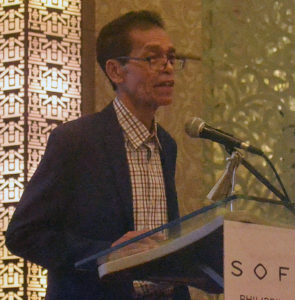
Instead of an outright ban or regulation of surcharges imposed by international shipping lines, the Philippine government should draft rules to monitor such surcharges, according to a study commissioned by The Wallace Business Forum (TWBF).
“A Study on International Shipping in the Philippines,” written by Dr. Epictetus Patalinghug and presented on October 30, recommends that the Department of Trade and Industry (DTI) refocus the thrust of the joint administrative order (JAO) it is drafting together with the Department of Transportation and Department of Finance toward the creation of monitoring rules that specify the criteria and procedures to be followed by carriers when they impose surcharges.
The draft JAO is a DTI-led initiative intended to regulate origin and destination charges imposed by foreign carriers, and to lessen or eliminate port congestion to address the high cost of international shipping. High shipping cost is a frequent complaint among stakeholders.
First presented to stakeholders for comments last February, the JAO originally had a July launch which did not push through. Trade Secretary Ramon Lopez later said the JAO will be turned into an executive order (EO) to give the proposed policy more teeth.

The JAO specifies that no origin and destination surcharges other than freight shall be charged by international shipping lines, regardless of whether the cargo is freight prepaid or freight collect, and that market forces allowed to determine surcharges and other fees freely. It also requires freight rates to include all charges, including terminal handling cost, container imbalance cost, emergency cost recovery charge, and bunker price adjustment from point of origin to point of destination.
The Patalinghug study, however, noted that the “regulatory trend in international shipping is to promote deregulation and pro-competitive policies. The proposal to regulate fees and charges of international shipping lines rests on the assumption that some shipping lines plying the intra-Asia routes impose excessive and questionable destination charges to the consignees. Granting, without accepting, that this hypothesis is true, the question to ask is how does this alleged practice arise in an industry that is considered competitive? And the most important issue is whether the burden and cost of the proposed regulations on the regulatory agencies and the requesting parties are far below its benefits.”
The study said the Association of International Shipping Lines (AISL), a group of foreign container shipping lines operating in the Philippines, has questioned the legal authority of the Bureau of Customs (BOC), eyed as the lead implementer of the JAO, to regulate charges imposed by shipping lines, arguing that Republic Act (RA) No. 10863 (Customs Modernization and Tariff Act) does not give the customs bureau such authority.
Furthermore, the World Shipping Council (WSC) argues that “surcharges are usually separated by shipping lines from base freight rates in order to specifically address the cost impacts to shipping operations and to achieve greater predictability in shipping lines’ revenue stream and to gain better transparency and understanding of shipping lines’ costs,” the Patalinghug study pointed out.
It added that according to WSC, surcharges are generally intended to recover distinct and identifiable costs separate from basic transport service, or to address rising or constantly fluctuating costs.
JAO to meet resistance
Patalinghug, in an interview with media on the sidelines of the study’s launch, said he is not against the JAO per se.
But he pointed out that while implementable, the JAO would meet challenges as no law has yet been passed giving any of the relevant government agencies the function to regulate international shipping lines’ charges.
He said that in view of this challenge, the study recommends that as a short-term measure, the government should create monitoring rules so it would know if and when a foreign carrier is imposing a surcharge before the government can actually regulate it.
The study also recommends that foreign carriers be required to publish their charges in advance, including the condition that requires the imposition of surcharges, timing of the imposition, rules on adequacy of notice of implementation, and the criteria for terminating a particular surcharge.
In addition, the study recommends that the BOC, as lead agency in the overall implementation of the JAO, build immediately a staff capacity geared towards monitoring various surcharges imposed and “at the same time pursuing dialogue with the shipping lines and other stakeholders on the surcharge issue.”
Another recommendation is that “foreign shipping lines may voluntarily publish (or post in their websites) all-in freight charges, inclusive of all charges, but unbundling the basic freight rate from the itemized surcharges, in order to promote transparency and accountability.”
The study added that the “risk of collusion through signaling is low vis-à-vis the benefits of transparency in an industry with many players.”
AISL general manager Atty. Maximino Cruz, in an interview with PortCalls on the sidelines of the study’s launch, welcomed the recommendation not to ban surcharges but instead to create monitoring rules first.
AISL president Patrick Ronas, also in an interview with PortCalls, said requiring shipping lines to publish their surcharges first prior to imposing charges “is possible,” previously done under the defunct Philippine Shippers’ Bureau of the DTI. He, however, pointed out this covered only “local charges, never freight rates.”
Vesting regulatory capacity in an agency
For the long term, the study recommends building regulatory capacity in a single agency tasked with promulgating the rules and regulations regarding charges that may be imposed by international shipping lines, logistics service providers, customs brokers, cargo truck operators, terminal operators and cargo yard operators.
It noted that the code of regulations of the US Federal Maritime Commission (FMC)—an independent federal agency responsible for regulating ocean-borne international transportation in the US—can serve as a starting benchmark.
FMC allows shipping surcharges, but imposes rules of transparency on the carriers that require them to publish their tariffs in advance or publish a conditional notice of intent to implement surcharges if certain conditions are experienced.
FMC also requires that all such carrier tariff rules be clear and definite as to the implementation and termination of the surcharge, based upon specific criteria related to the expected or actual port condition. FMC’s staff also continuously monitors port congestion and related surcharges.
In a presentation during the launch, Patalinghug noted that the Philippines is unique in that it has several government agencies overlooking shipping and ports regulations, including BOC, Philippine Ports Authority, and Maritime Industry Authority, but that they do not have the function of regulating intentional shipping charges.
TBWF, which provides policy research and consultancy services, said it commissioned such a study as part of its advocacy to help the public and the government to better understand issues before policy creation. TBWF said copies of the study have been submitted to the relevant government agencies and lawmakers. Patalinghug also said he has presented the study to the Philippine Competition Commission. – Roumina Pablo
